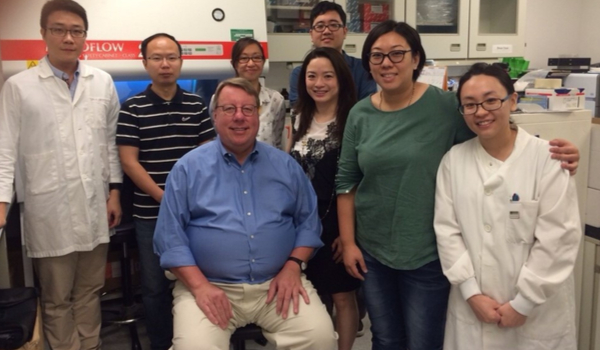Creator and chair of the Hong Kong Hereditary Breast Cancer Family Registry. Women’s Surgical Chapter founder with the College of Surgeons of Hong Kong—and its first chair. First woman to attain a clinical associate professorship in surgery in Hong Kong. Chief of the breast surgery division at the Tung Wah Hospital Breast Centre.
Ava Kwong, M.D., Ph.D., whose work since 2018 has been supported by the Asian Fund for Cancer Research, tenaciously pursues better treatments and cures for breast cancer. As the esteemed University of Hong Kong physician-scientist insists, she can’t—and won’t—let up.
In Hong Kong alone, one in 21 women suffer from breast cancer, and the numbers are increasing. In Mainland China, as in most other countries, breast cancer is the most common cancer among women. Indeed, worldwide, Chinese women account for 12.2% of all newly diagnosed breast cancers and 9.6% of all breast cancer deaths.
“The rates of cancer are certainly going up in China and Asia as a whole,” says Dr. Kwong. “The age of onset of some cancers, such as breast cancer, are younger compared to the West. In fact, breast cancer is the most common cancer in women in Hong Kong and in Mainland China, accounting for 15% of all new cancers in women in China.”
In line with our organization’s commitment to high-quality research specific to cancers prevalent in Asia, AFCR funds Dr. Kwong’s efforts at understanding particular genetic oncological risks in the region. She has already conducted the first and largest cohort of BRCA1 and BRCA2 analysis in Hong Kong, in which her team identified 9.5% of the people that are the starting point, the “patient zero,” of a family’s genetic inheritance with BRCA mutations.
In the West, hereditary mutations in these two genes contribute from 5-15% of patients with hereditary breast and ovarian cancer syndrome (HBOC). The mutations are known to increase the risk of breast cancer and ovarian cancer by 50-87% and 10-40%, respectively, by the age of 70. In addition, there are other known gene mutations that contribute to a predisposition to HBOC.
To assess if the prevalence — and thus the risk — of HBOC is similar in Mainland China and Hong Kong as it is in the West, Dr. Kwong’s team uses blood samples from patients in Hong Kong and from Peking University Shenzhen Hospital with a family history of breast or ovarian cancer.
“Genetic testing will become the normal in cancer research not on risk assessment or predictions, but rather for targeted therapies and personalized treatment, and this area of research will expand for breast cancer,” Dr. Kwong states. “More advanced technology-based research would include less invasive type ablative treatment, more cosmetic outcome orientated breast surgery and more targeted surgical treatment.”
Gene testing, she predicts, will have an even greater impact on cancer care in the future than it does now. As of April 2019, the Hong Kong Hereditary Breast Cancer Family Registry, which Dr. Kwong established, has supported over 3,000 families for genetic testing.
“Cancer incidence is likely to increase, and the upward trend will be both in rural and urban areas, with the age of onset becoming younger,” reflects Dr. Kwong. “We need more understanding between environmental and genetic causes and understanding risk. Hence our work on risk assessment is extremely important.”
Important, indeed. And AFCR is proud to be supporting this work which promises to greatly improve the prognosis and quality of life for future breast cancer patients throughout Asia and the rest of the world.

